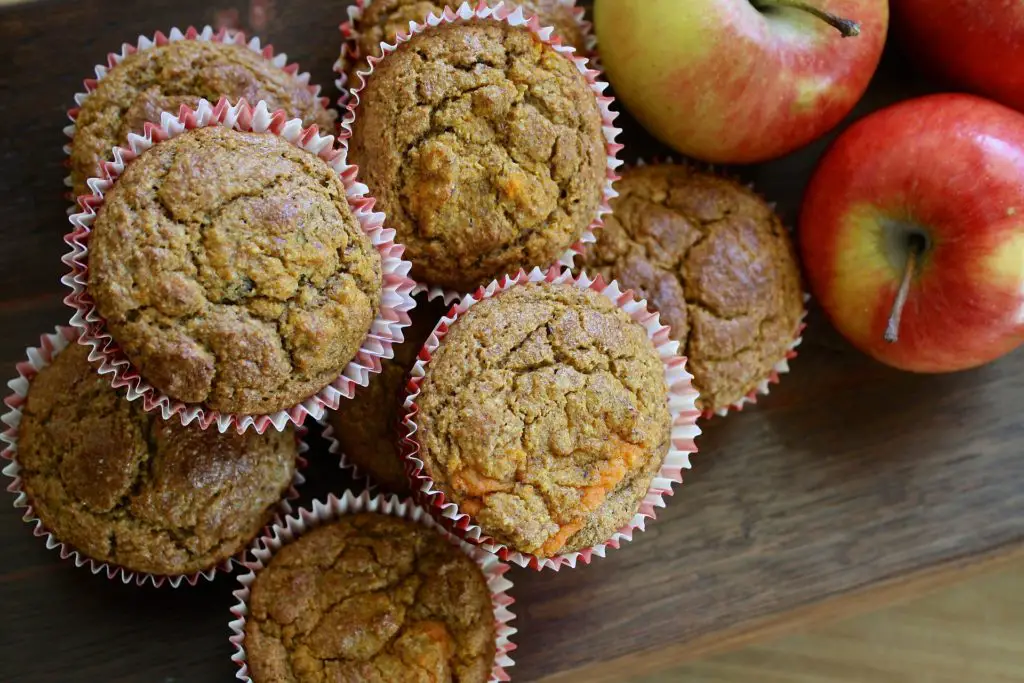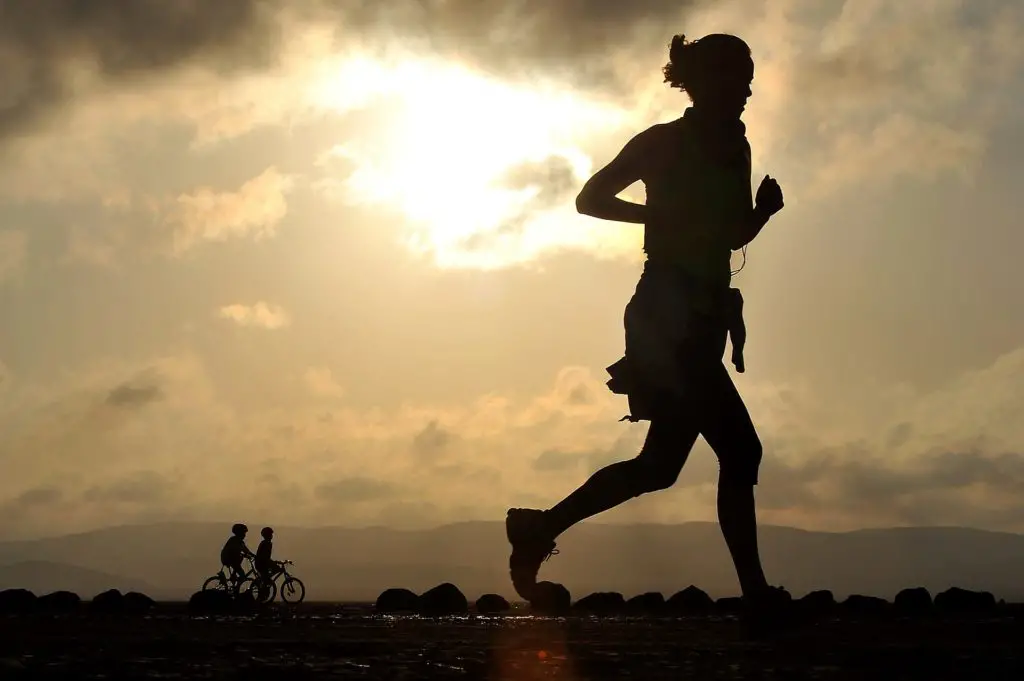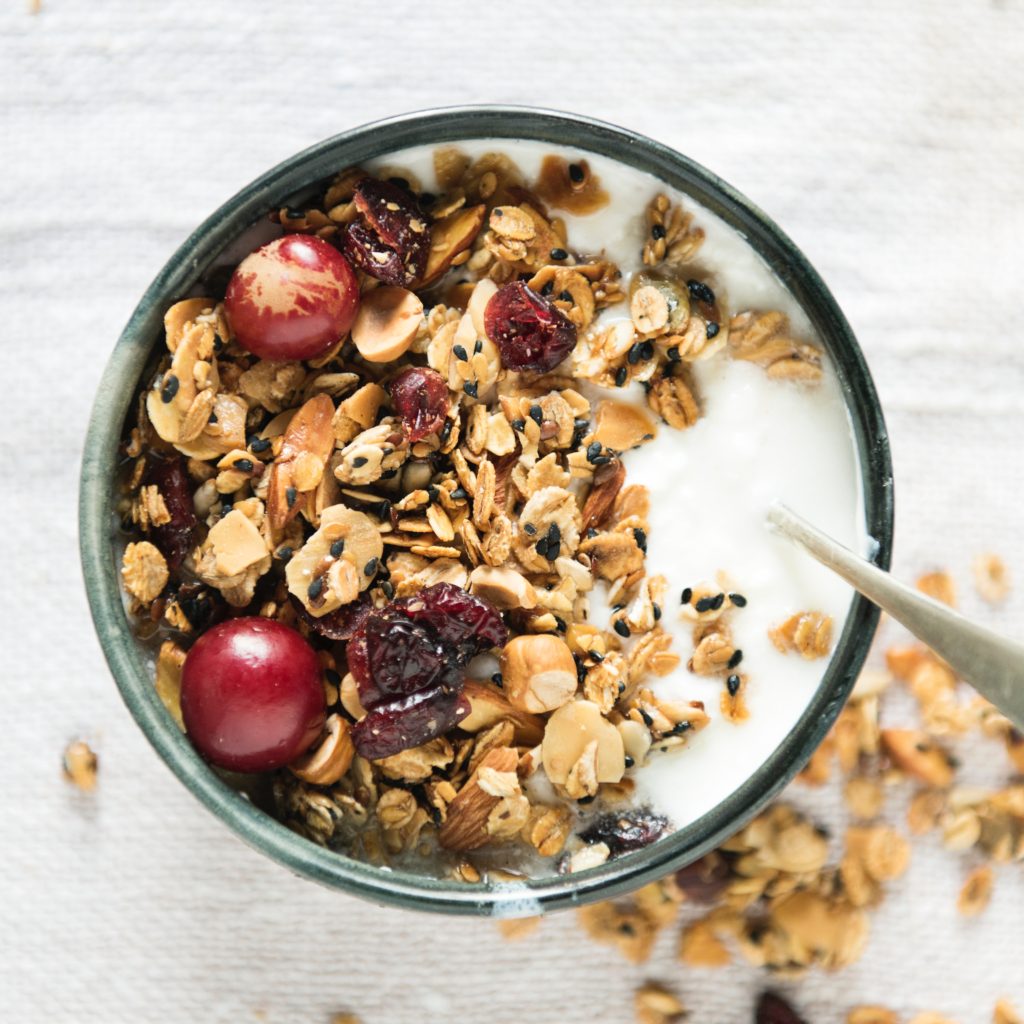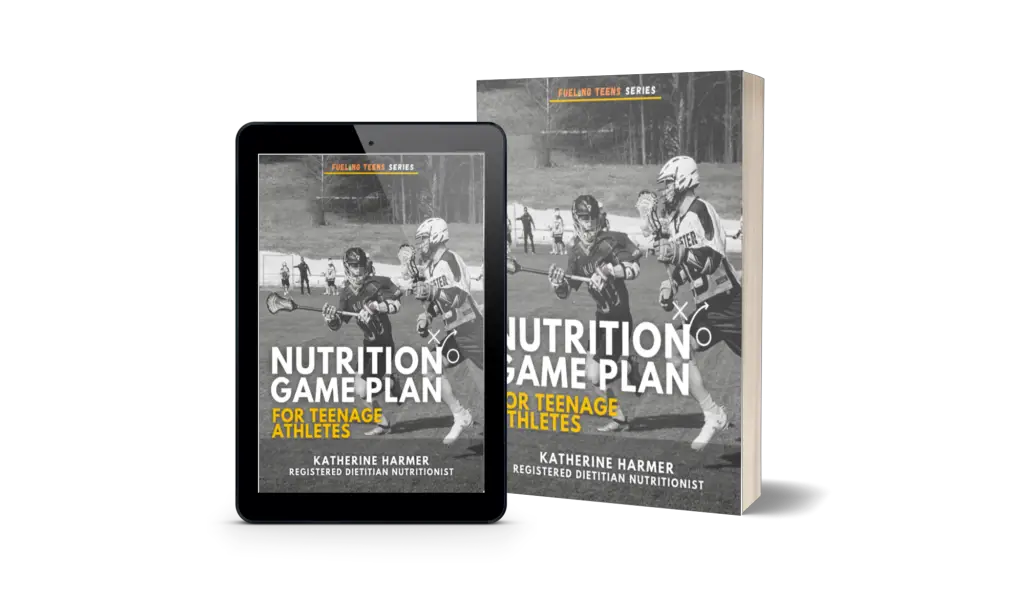In order for athletes to train and perform better, proper nutrition is essential, especially during high school while athletes are still growing and developing. Before you begin a training session, fuel your body so it can give you the energy you need to exercise and become stronger.
With workouts, pre-fueling and re-fueling are key. Being thoughtful and carefully planning what you eat before and after a workout will help you maximize the benefits of training.
The best pre-workout snacks for teenage athletes include a healthy mix of complex carbohydrates, protein, and fluid. Some of the best examples of snacks include a protein fruit smoothie, toast with nut butter, a PB&J sandwich, an energy bar, or fruit with whole wheat crackers.
And remember- food is better than supplements! While supplements can be helpful, it is usually better to get nutrients from food than from supplements.
Here are my tips for intentionally thinking about nutrition before a workout. I’m going to share my 25 favorite pre-workout snacks that are actually enjoyable and nutritious for teens!

Also be sure to check out my post-workout snacks here!
Why Should You Eat Before a Workout?
If you don’t eat before a workout (at least 30 minutes to 2 hours before), you aren’t giving your body the fuel it needs. You could feel lethargic, dizzy, nauseated, fatigued, lightheaded, and your performance could be negatively impacted.
But it’s important to keep in mind, if you’re exercising at moderate intensity for less than 45 minutes, you likely don’t need to pre-fuel with a snack. Your body should have enough energy stored from previous meals to be able to give you the fuel you need.
When Should You Eat Before a Workout?
Your muscles need an extra boost of fuel for workouts of high intensity or long duration. Timing is important! If you train later in the day, you don’t always need a snack to fuel your workout, just wait a few hours after eating a well-balanced meal before exercising.
The recommended time for a pre-workout snack or meal stands between 30 minutes to 4 hours before exercise. Experiment with what works best for you! Your body needs enough time to digest to use the nutrients it needs for fuel, and also to make sure you aren’t uncomfortable working out on a full stomach.
You might want to have a pre-workout meal 3-4 hours before a workout or game, and then have a snack 30 minutes to 1 hour before for best results ad highest energy stores.

What To Look For in a Pre-Workout Snack:
When you are looking for the best pre-workout snack, the short answer is that you should eat whatever your stomach can handle before a workout or game! Just go easy on the added sugar, fat, and fiber.
Pre-workout snacks and meals should be easy to digest, and not too hard on your stomach.
Recommendations for pre-workouts meals are foods that are high in carbohydrates, low in fat, moderate in protein, and moderate in fiber. Fatty foods and high fiber can upset your stomach, you don’t want to overload your digestive system or cause discomfort. The goal is to give you the energy and nutrients needed to fuel a good workout.
You’ll want your pre-workout snack to contain about 100-300 calories, 10-20 grams of protein, and at least 30-45 grams of carbohydrates. Eat it between 30 minutes to 2 hours before a workout and you’ll be appropriately fueled.
There’s no one right answer for the absolute best workout snack. Your individual digestion and metabolism is what matters. What can your stomach handle and how much energy do you need in the appropriate time frame? It’s best to experiment with different types of snacks and the timing before a workout. You’ll find what works best for you!
Components of a Pre-Workout Meal:
1. Carbs
For athletes, carbohydrates are your friend and your body’s #1 preferred fuel source during exercise! When we eat, carbs break down into glucose in our bodies which fuels our muscles so that we can exercise at our maximum level.
Your muscles store extra glucose as glycogen to use later on for exercise. Carbohydrates also adapt the muscle to training so you can perform better next time. If you eat carbohydrates before a workout, you are ensuring that your body has enough fuel to replenish your muscle’s energy stores.
If you don’t have enough glucose during exercise, your body will have to find fuel from other sources that aren’t as efficient and you’ll feel weak and tired a lot easier and faster.
What are carbohydrates? Carbohydrates are natural sugars, fiber, and starches. You can find carbohydrates mainly in fruits, dairy foods, breads and grains, and sugary foods.
You’ll want to decrease added sugars, you don’t want to fuel your workouts with sugary foods because you’ll likely “crash” later in the day and crave other unhealthy foods. Choose to nourish your body with healthy carbohydrates such as grains, low-fat dairy, and fruits. Simple carbohydrates are recommended because they are digested quickly and provide your muscles with quick energy.
Examples include: greek yogurt, granola bars, a piece of fruit, oatmeal, dried fruit, crackers, toast, juice.
Choose carbs low in fiber for gut comfort and low on the glycemic index for a more sustained source of fuel.
See also: How Many Carbs Does a 15 Year-Old Teen Need? Ask a Dietitian!
2. Protein
Of course you already know protein is important before a workout, but you don’t need to focus on protein as much as you think BEFORE a workout. You will want a moderate amount of protein before exercise (you don’t need to get crazy). The goal is around 10-30 grams of protein before exercise as well as 3-4 more times during the day.
You don’t need to eat too much because your body can’t store extra protein. When you exercise, your body repairs muscles and builds them stronger and bigger than before. You need to eat protein for this to happen! You’ll want to refuel with protein after exercise plus regularly throughout the day to encourage the most muscle growth.
What foods have protein? The nutrient protein is found in foods from the protein food group: meat, beans, eggs, nuts, and also in dairy foods.
Examples include: a slice of turkey meat with cheese, hummus, a hard-boiled egg, greek yogurt, a handful of almonds, chocolate milk.
What about Protein Powders? Food is the best way to get the nutrition you need, but is protein powder ever appropriate? Yes, sometimes it is! You don’t need 3 scoops before, during, and after a workout like some of the guys you will see at the gym.
Remember, your body can’t use that much protein. If you eat extra protein that your body doesn’t need, it is dismantled, or broken down, and used for energy or other body processes, with the remnants being excreted.
Protein powder is beneficial if you don’t want to eat a big snack but want to make sure you’re getting enough protein throughout the day, or when you need a quick snack with high protein. I only use a few tablespoons by adding it to my smoothies, oatmeal, or plain milk.
Check out my post: Is Whey Protein Safe for Teenage Athletes? for additional tips with protein powders for teens and recommendations of the best and safest brands, including options like NAKED and Orgain.
3. Fluid
It is important to hydrate before, during, and after a workout session. Drink about 2-3 cups within an hour before your workout, then drink about 1 cup every 10-20 minutes of heavy exercise, especially when you are sweating. Be sure to rehydrate after your workout as well.
Dehydration can negatively impact your workout, so make sure you are prepared with a large water bottle! Read this post to learn when sports drinks are appropriate for teens.

25 Best Pre-Workout Snacks for Teenage Athletes:
What are your favorite pre-workout snacks that include carbs, protein, and fluid? Here are some of my favorite pre-workout snacks and meals that include all 3. Don’t forget the water!
- Protein smoothie with Greek yogurt, chia or flax seeds, frozen fruit, frozen vegetables, and your choice of milk. You can also add protein powder if needed (but there’s plenty of protein already from the yogurt, seeds, and milk. You can also add oats and nut butter). Drink half before your workout and half after.
- 1 scoop of protein powder in milk, water, or in a shake. Eat with a piece of fruit
- 1 LARABAR and 1 string cheese
- 1 cup Greek yogurt parfait with granola and fruit
- Small handful (1/4 cup) of trail mix nuts and dried fruit.
- Granola bar (look for lower added sugar and higher protein)
- 1/4 cup hummus with 6 whole wheat crackers and veggies
- Toast with 1 Tablespoon peanut butter and banana
- String cheese and 8 whole grain crackers
- Apple, banana, crackers, or celery with 1-2 Tablespoons peanut butter
- Rice cakes with 1 Tablespoon nut butter and a banana
- Oatmeal with a nut butter or protein powder, and fruit
- 1 cup pasta with chicken
- Bagel with 1 T peanut butter
- 8 oz juice and a hard-boiled egg
- 1 cup low-fat cottage cheese and fruit
- 1.5 cups cold cereal and 1 cup milk
- 1/4 cup almonds and 1 apple
- 12 oz chocolate milk (but may be better for a post-workout snack)
- String cheese and apple
- 1/2 cup pretzels and 1 T peanut butter
- PB&J sandwich
- Energy bar – such as LARABAR
- 1 cup juice and 2 hard-boiled eggs
- String cheese and 4 oz applesauce
Try to stay away from vending machine food. Most high school sports teams practice right after school, therefore you need to plan ahead and bring a healthy snack with you so you can fuel up in between class and practice. Plan ahead for a filling snack, it’s worth it.
Fueling Teens eBooks
Check out my newest eBook: Nutrition Game Plan for Teen Athletes Written for teen athletes, parents, and coaches. This eBook includes:
- 50+ pages with insightful infographics
- 28-day meal plan to help you eat well and eat right
- Healthy Snack list
- Tips for Gaining or Losing Weight
- Calculations for Daily Calorie Needs, Protein Needs, etc.
- Supplement Recommendations
- Meal Schedule
- …And More
Related Questions:
What if you Don’t Like Working Out on a Full Stomach?
What if you exercise first thing in the morning and don’t want to eat breakfast first? It can be okay to work out on an empty stomach, but something is better than nothing. You need a little fuel in the tank.
Try eating half a slice of toast with peanut butter, grabbing a handful of dried fruit and nuts, or at least drinking a few gulps of 100% juice before a workout. Do what you can, and your training, endurance, and recovery will improve!
If your workout is 45 minutes or less, or not intense enough to build up a sweat, then you likely are fine without a pre-workout meal/snack.
What is the Best Diet for a Teenage Athlete?
Teenagers should not be going on diets, but this is a great time to develop overall healthy eating habits that will benefit them for a lifetime. Teen athletes should eat a balance of food including healthy carbohydrates, lean protein, healthy fats, fruits and vegetables. No food should be “off limits” or labeled as “bad”. All foods can fit in appropriate balance and portion sizes.
I wrote a post about calorie amounts for certain teenage athletes to give you a good starting point. Check it out here.
Need more help with nutrition this sports season? Check out my free sample meal plans:
- Meal plan for football athletes
- Meal plan for basketball athletes
- Meal plan for soccer athletes
- Meal plan for other teenage athletes
Pre-Workout Snacks Summary
● Why: Nourish your body to give your muscles energy to get the most out of any workout.
● When: If your workout is first thing in the morning, greater than 45 minutes, or high intensity for 30 minutes or more, you should consider adding a pre-workout snack. Eat about 30 minutes to 2 hours before exercise.
● What: Include high carbohydrates, moderate protein, and fluid. The goal is around 100-300 calories total, 10-20 grams of protein, and about 30-45 grams of carbohydrates an hour or so before a workout.
Check out some of my other sports nutrition posts:
- The BEST Post-Workout Snacks for Teenagers – Dietitian Recommended!
- Is Whey Protein Safe for Teenage Athletes?
- Should Athletes Drink Alcohol?
- The Best Fruits for Teenage Athletes.
- FREE Meal Plan for High School Football Athletes
Written by Katherine Harmer, Registered Dietitian Nutritionist
Fueling Teens is a participant in the Amazon Services LLC Associates Program, an affiliate advertising program designed to provide a means for sites to earn advertising fees by advertising and linking to Amazon.com. We also participate in other affiliate programs which compensate us for referring traffic.

